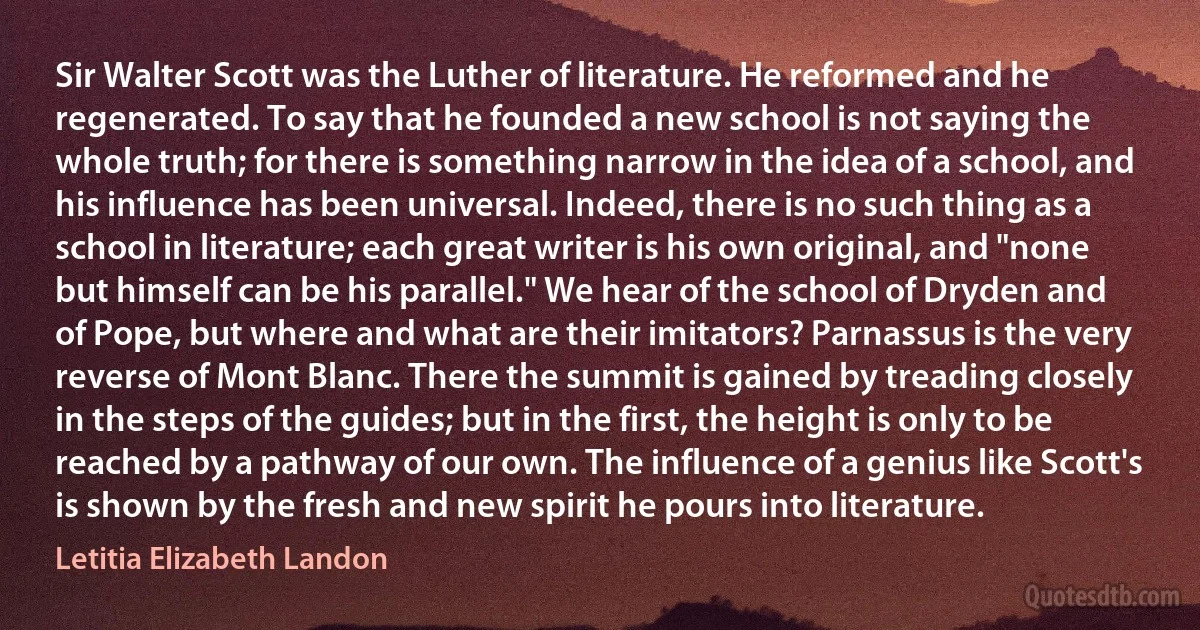
Sir Walter Scott was the Luther of literature. He reformed and he regenerated. To say that he founded a new school is not saying the whole truth; for there is something narrow in the idea of a school, and his influence has been universal. Indeed, there is no such thing as a school in literature; each great writer is his own original, and "none but himself can be his parallel." We hear of the school of Dryden and of Pope, but where and what are their imitators? Parnassus is the very reverse of Mont Blanc. There the summit is gained by treading closely in the steps of the guides; but in the first, the height is only to be reached by a pathway of our own. The influence of a genius like Scott's is shown by the fresh and new spirit he pours into literature.
Letitia Elizabeth LandonRelated topics
fresh genius great height idea narrow none parallel pathway pope say saying school show something spirit thing truth universal blanc luther scottRelated quotes
Pity those-adventurers, adolescents, authors of young adult fiction-who make their way in the borderland between worlds. It is at worst an invisible and at best an inhospitable place. Build your literary house on the borderlands, as the English writer Philip Pullman has done, and you may find that your work is recommended by booksellers, as a stopgap between installments of Harry Potter, to children who cannot (one hopes) fully appreciate it, and to adults, disdainful or baffled, who 'don't read fantasy.' Yet all mystery resides there, in the margins, between life and death, childhood and adulthood, Newtonian and quantum, 'serious' and 'genre' literature. And it is from the confrontation with mystery that the truest stories have always drawn their power.

Michael Chabon
[About whether critics have influenced his work:] None could have, because I don't read them. I doubt anyone does, except other critics. It seems like a sealed-off field with its own lieutenants, pretty much preoccupied with its own intrigues. I got a glimpse into the uses of a certain kind of criticism this past summer at a writers' conference – into how the avocation of assessing the failures of better men can be turned into a comfortable livelihood, providing you back it up with a Ph. D. I saw how it was possible to gain a chair of literature on no qualification other than persistence in nipping the heels of Hemingway, Faulkner, and Steinbeck. I know, of course, that there are true critics, one or two. For the rest all I can say is, "Deal around me.”.

Nelson Algren
When the streets are paved with brilliants and the skies made of rainbows I suppose you'll be contented and satisfied with red, blue and yellow.... how to satisfy your tawdry friends while you steal back into the mild evening gleam and quiet middle term[? ]. I'll tell you, my sprightly genius, how this is to be done. Maintain all your lights, but spare the poor abused colours till the eye rests and recovers. Keep up your music by supplying the place of noise by more sound, more harmony and more tune, and split that cursed fife and drum.... he [Mr. Garrick] must feel the truth of what I am now saying, that neither our plays, paintings or music are any longer real works of invention, but the abuse of Nature's lights and what has been already invented in former times.

Thomas Gainsborough
Nations are represented by their poets and their writers in the open competition for the Nobel Prize. Consequently the award of the Prize by the Academy glorifies not only the author but the people whose son he is, and it bears witness that that nation has a share in the universal achievement, that its efforts are fruitful, and that it has the right to live for the profit of mankind. If this honour is premous to all, it is infinitely more so to Poland. It has been said that Poland is dead, exhausted, enslaved, but here is the proof of her life and triumph. Like Galileo, one is forced to think when before the eyes of the world homage has been rendered to the importance of Poland's achievement and her genius.

Henryk Sienkiewicz
This tendency, however, to ascribe an universality of genius to great men, led Dryden to affirm, on the strength of two smart satyrical lines, that Virgil could have written a satire equal to Juvenal. But, with all due deference to Dryden, I conceive it much more manifest, that Juvenal could have written a better epic than Virgil, than that Virgil could have written a satire equal to Juvenal. Juvenal has many passages of the moral sublime far superior to any that can be found in Virgil, who, indeed, seldom attempts a higher flight than the sublime of description. Had Lucan lived, he might have rivalled them both, as he has all the vigour of the one, and time might have furnished him with the taste and elegance of the other.

Charles Caleb Colton
